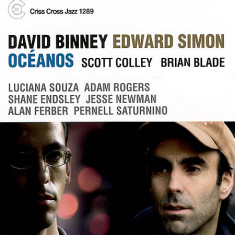Review by Brad Walseth
Continuing a partnership that has existed since Venezuela-born keyboardist Edward Simon first played on saxophonist David Binney's debut album Point Game in 1989, "Oceanos" is the sixth collaboration between these two friends. Featuring the rhythm section of Scott Colley on bass and drummer Brian Blade, along with guitarist Adam Rogers, trumpeters Shane Endsley and Jesse Newman, trombonist Alan Ferber, percussionist Pernell Saturnino and vocalist Luciana Souza, "Oceanos" again explores the two artists' shared love of Brazilian and Latin tinted jazz. The recording successfully merges the south-of-the-border musical idiom with both composers' love of complex structure, and the final creation is an album that can be enjoyed both by those who love challenging arrangements and inspired playing as well as by those who will simply enjoy the lovely melodies and Latin rhythms and coloration.
Binney's "We Dream Oceans" starts things off with a real spark of energy. Somewhat reminiscent of Return to Forever's work with Flora Purim, but harder edged and unquestionably within Binney's unique composition style, this piece is 7:28 of hard charging rhythm - brilliantly provided by Blades, Colley and Saturnino, over which Simon adds expressive piano waves and Souza's clear vocal tones hover. But it is Binney - certainly one of the most exciting alto players of the modern era - who shines most brightly and plays some of the most incendiary solos you will hear. Not that this is any surprise to anyone who has heard Binney; here he doesn't perhaps burn as torturedly as he did on "Cities and Desire" (one of the finest tour de force performances of emotive playing in recent history), nor does he hold back and play with holding tones as he did on the stellar "Out of Airplanes," but this recording reveals aspect of the Binney oeuvre - one falling somewhere in between and assuredly piloted toward the Southern Cross.
Simon follows with his "Impossible Question" and the delightful modulating deviations lead the listener through pleasantly surprising vistas highlighted by Rogers' engaging guitar work, Simon's deceptively relaxed embellishments and Blade's dynamic impetus. Bassist Colley contributes "Amnesia," and this welcome imposition gives Binney, Endsley and Simon the chance to conflagrate over the shifting bass groove and Blade's cunning pulsations. "El Parrandero" starts with quirky piano (another Binney motif) over Blade and Saturnino's percussive dueling. Rogers comes in with a snaky guitar which is mimicked by the trumpet, and the brass (as they do throughout the recording) fill in with warm ornamentative swells. Simon's solo - full of starts and stops, twists into unexpected directions and Binney simply explodes Latin saxophone cliches with his adventurously original turn.
Simon's lovely ballad to his son - "Govinda" slows the pace in timely fashion. Here Rogers' guitar morphs into Souza's plaintive voice, Binney joins in and he and the singer soar along the towering melody hook; Simon then modulates his arpeggiated theme into minor, and the end result is an extremely satisfying and bittersweet jazz lullaby. "Twenty-Four Miles to Go" is an extremely complex work with many shifts, changes and daunting sections. Pianist Simon opens up with some of his finest playing on the session, before composer Binney lays into whitewater rapid-like solos atop the churning Blade and Colley.
The album ends with an enticing reprise of Simon's "Impossible Question," - complete with Binney threatening to tear through the fabric of the universe and reach another dimension in his gyroscopic solo, and finally a charming version of Binney's haunting "Home" (a captivating composition that also appears on "Out of Airplanes") in which Simon adds a loving and graceful piano gloss and Binney's solo outro is sweetly melodic . If you haven't yet heard David Binney, I can only say this is one artist you must hear. "Oceanos" is another wonderful release from Binney and one that signals an exciting maturation of his ongoing work with fellow musical explorer Edward Simon.
|

